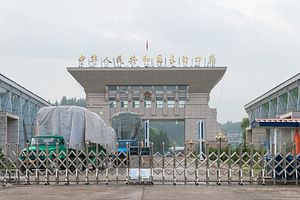The Panama Papers illuminate well the futility of UN sanctions on achieving its stated aims of restricting North Korea’s weapons program.
The fact that Mossack Fonseca incorporated the Pyongyang front company, DCB Finance Limited, run by Nigel Cowie, a British businessman, despite the fact it should have been flagged as an obvious high-risk destination, shows how front companies and other entangled financial webs can be knitted together to maneuver around economic sanctions. More serious allegations have even suggested that DCB was used as a front for the purchase of weapons.
Nigel Cowie states that he was unaware that his company was being used as a front for weapons trading and it is very likely he is right. Whether one agrees with his level of engagement within North Korea or not, Cowie was trying to do business in a country which has huge economic potential, from its enormous untapped levels of mineral resources to its well-educated and disciplined workforce. The fact that certain transactions are now deemed illegal because of resolutions passed at the UN Security Council undermines the changes happening in North Korea with a growing desire of its citizens to trade and make money.
Trading in North Korea before the 2004 sanctions were implemented, Cowie had to find an alternative means of doing business in the DPRK once the new sanctions were in place. Without the sanctions, it is feasible that Cowie’s business would have prospered. Would that have been such a bad outcome? The bank he set up could have been used to support loans for infrastructure, develop North Korea’s financial sector, and employ ordinary North Koreans. Opening up the country to commercial, transparent international business was always going to be incredibly challenging, but it is now almost impossible with the current sanctions in place.
Just last week, the Australia clothing giant Rip Curl announced that it had been part-manufacturing its clothes in the DPRK but has since removed all operations. While the elites would have no doubt stashed away their fair share of any money received, the workers themselves are the biggest losers, having now lost jobs and another gateway, however small, to life in the outside world.
In 2000, before 9/11 and the subsequent Axis of Evil mantra, opening up North Korea to global capitalism did not seem an impossibility. With North Korea still recovering from its famine in the 1990s, Nigel Cowie said in a Wall Street Journal interview just after the historic visit of then U.S. Secretary of State Madeline Albright that “There is an effort to try to get the country going again…The door is open for investment, and they’re not going to slam it again.”
Almost tragically, since then, relations have deteriorated to the extent that North Korea’s leadership is convinced that the only real way to survive is to proliferate nuclear weapons. This in turn has led to further economic sanctions. The leadership has learned the lessons of Saddam and Gaddafi and with sovereignty in its view being violated twice, the DPRK is now not only closed, but genuinely suspicious – perhaps with good reason.
Despite the latest sanctions in North Korea being the most far-reaching and crippling of any UN sanctions ever imposed on a nation, they have done nothing to stop the country from persisting with its nuclear weapons program. Nuclear and missiles tests this year are a damning indictment of the effectiveness of these sanctions, which are quickly amounting to a face-saving exercise for the world’s superpowers, which have so often been outmaneuvered and manipulated by Pyongyang.
The enforceability of the sanctions in China – so crucial to their success – is also dubious. Sanctions are bypassed by private citizens through black markets, regardless of whether China, at the state level, chooses to enforce them or not. This is creating a larger illicit economy than then one which already exists.
The tragedy of all this is that sanctions hurt ordinary North Koreans who suffer worse from a country that cannot officially trade on the international markets but whose elites can continue to do so through back channels and deals conducted on stunning offshore beaches or in Chinese border cities. It is not Kim Jong-un and his close network of comrades who will suffer, because as the Panama Papers have shown, the rich and powerful are able to conduct business by circumventing ordinary means of doing business.
Humanitarian work also suffers from sanctions. NGOs are trying to carry out life-saving work, tackling the high levels of malnutrition – which rose 30 percent last year alone – while also treating easily curable infectious diseases and distributing basic medicines. It is not uncommon for European aid agencies operating inside North Korea to carry large amounts of cash with them to circumvent the sanctions on banks, with the German NGO Welthungerhilfe openly stating that sanctions have made humanitarian work in the DPRK extremely difficult.
Sanctions have not been successful in restricting DPRK nuclear weapons ambitions nor in curtailing the elite’s wealth. The Panama Papers show that the irresistible lure of trade and money only moves finance deeper into the black market if deals cannot be conducted through conventional channels. As shown repeatedly, capitalism changes and shapes societies rapidly. Rather than restrictions, opening North Korea up to more international trade would be more effective in challenging the leadership.
Jack Hands presents the leading North Korea Podcast Show and is a former political advisor, having worked in the U.K. and European parliaments. He has written for several major political blogs, notably Conservative Home. He is a former founder of North Korea Campaign UK, which campaigned for awareness of the plight of political prisoners inside North Korea. Follow him on Twitter @jackhands1.

































